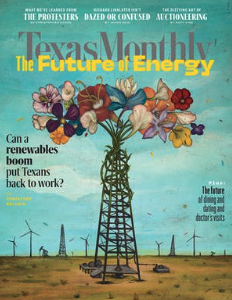The 'Mother Fracker' Reckons With the Mother of All Oil Busts | Texas Monthly | June 2020
One morning in mid-April, Scott Sheffield, the chief executive of Pioneer Natural Resources, one of the largest oil producers in America, seated himself in the wood-paneled boardroom of his company’s headquarters in Irving, gazed into his computer’s camera, and begged a trio of Texas politicians for a lifeline. Over the past two months, oil prices had tanked 60 percent, effectively ending a years-long Texas boom and heralding what many in the industry were calling “the mother of all busts.” As an estimated 30,000 viewers around the world watched online, Sheffield beseeched the three members of the Texas Railroad Commission, the elected body that regulates the state’s oil industry, to limit production, in a bid he hoped would ultimately boost the global price of crude.
Sheffield’s message bordered on heresy. He declared that the same oil revolution that had transformed the United States from petroleum importer to exporter had brought the industry to the brink of financial ruin. “It has been an economic disaster, especially the last ten years,” he said in testimony that had the feel of a key witness turning state’s evidence. “Nobody wants to give us capital because we have all destroyed capital and created economic waste.” If the government didn’t swoop in to save Texas oil producers from their excesses, Sheffield warned, “we will disappear as an industry, like the coal industry.”
It was a stunning admission coming from a man who has done as much as anyone to engineer a geological and geopolitical bonanza, one that now looks like a bubble. But the request for government intervention was also a characteristically strategic play for self-preservation by one of the longest-serving chieftains of the oil business—an industry that, following decades of expansion, now appears on the cusp of a slow, long-term decline.
With a love of the limelight, a flair for the dramatic, and an instinct for the jugular, Sheffield, a 68-year-old native of Dallas, has had a hand in the Texas oil sector’s every major swing over the past 45 years: a surge during the oil shocks of the seventies, a falloff throughout the eighties and nineties, and a renaissance starting in the early years of this century as the world sought massively more oil products and Texas unleashed new drilling and fracking technologies to serve up those hydrocarbons. Today, as the oil industry contracts, Sheffield is at the vanguard of a fight for market share, and for survival.
Sheffield took a modest family firm and ballooned it into a publicly traded behemoth—one that, before this spring’s crash, was valued at $26 billion. He did it by pursuing a straightforward strategy: drill, baby, drill. Through Republican and Democratic presidencies, in peace and in war, and to the general delight of investors, Sheffield’s Pioneer pumped up its stock by pumping ever more West Texas crude. Blessed by profitable acreage that Pioneer and its corporate predecessor locked down decades ago, when few others wanted it, and aided by aggressive lobbying in Austin and Washington, D.C., Pioneer grew to become the top driller in the Permian Basin and one of the biggest exploration and production companies in the country. By 2019, the Permian accounted for almost 40 percent of U.S. oil production and fully 5 percent of the global total—an amount nearly equal to the output of Iraq, the world’s sixth-largest producer.
But the Texas boom paralleled other seismic shifts in the international energy market—developments that pose an existential threat to petroleum. Global oil-demand growth has been slowing, and investor concerns over the environmental costs of burning fossil fuels have been increasing. These twin trends have prompted a broadening consensus, even among industry veterans, that oil’s best days are numbered. Yet until recently, Pioneer and most other Texas producers kept cranking out more and more oil—partying like it was 2005.
Now the party’s over. The Texas oil patch and the global energy markets were knocked down this spring by what Sheffield called a “double black swan” event: the simultaneous arrival of a pandemic, which slashed global demand, and a market-share fight between petroleum giants Russia and Saudi Arabia, which flooded more oil into that cratering market. But sober-minded industry insiders see that downturn as far more than another cyclical swoon. They view it as hastening a structural shriveling and consolidation that was already underway—a contraction likely to continue even though oil prices, starting in late April, began to recover. The energy sector’s share of the Standard & Poor’s 500, a key stock index, has tumbled from 29 percent in 1980 to 3 percent as of early June. “The era of rapid growth isn’t going to come back anytime soon”—and probably not at all, said Bob Brackett, a former oil-company executive and now an analyst at asset management firm Sanford Bernstein. “Industries sometimes behave in odd ways as they move toward senescence.”
Read more here.
